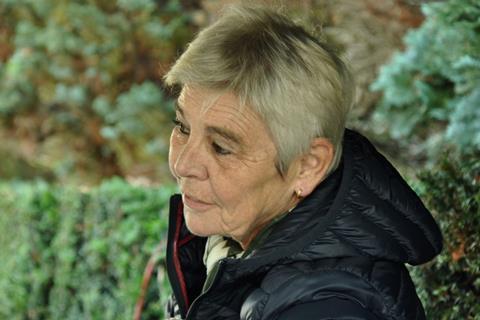
The work of Belgian filmmaker and former trapeze artist Marion Hansel was the subject of a career retrospective at the International Film Festival Rotterdam (IFFR) this January.
She is happy to be at the festival after a hairy couple of years. Not long ago she noticed she was frequently feverish and her body temperature would soar each night. After a visit to A&E and some tests it was found she had a streptococcus in her bod that was causing an infection.
“[The streptococcus] was sitting on my aorta valve,” Hansel explains. “It was eating it. The valve was nearly going to explode.”
She had immediate open-heart surgery to insert an artificial valve and then stayed in hospital for two months to take a course of extremely powerful antibiotics to get rid of the bacterial parasite.
While in hospital, Hansel was well enough to work and this was when she conceived her autobiographical essay film, There Was A Little Ship (Il Etait Un Petit Navire), which screened as an international premiere at Rotterdam this year. It’s a deeply emotional affair in which she uses newly-shot material, archival footage and voice-over to revisit some of the haunts of her past.
By any standards, Hansel has had an extraordinary life. She has acted and performed circus tricks in the films of Agnes Varda; she has run her own production company Man Films for more than 40 years; she has directed all sorts of movies, everything from Dust, an adaptation of a JM Coetzee novel which featured one of the last performances of Trevor Howard and won the Silver Lion in Venice, to Nuages, Lettres A Mon Fils, a documentary in which she travels around the world, filming clouds.
As There Was A Little Ship reveals, Hansel, who was born in 1949 in Marseille, left home as a teenager to study painting at an art school in Devon. She was miserable there.
“I learned English and I learned a little bit of painting but I didn’t expect to be so homesick for my family,” she recalls.
Realising she wasn’t going to become a great artist, she shifted ambition and decided to act instead. She did two years of circus school, specialising in the trapeze but also learning such other useful skills as tightrope walking, tap dancing, juggling and acrobatics.
“I had acted in several theatres in Brussels, a little bit in television and a little bit in film” she says. “I thought if I learned techniques that other actors cannot do, I will get some more jobs.”
The strategy worked to a degree. Varda hired her twice, drawing on her circus skills in One Sings The Other Doesn’t (1977) and in a TV drama.
“I never wanted to be a circus artist. My goal was to get more parts in films,” Hansel says.
Realising she wasn’t going to be a great actress, Hansel decided to direct. “I started writing a short script for a short film,” she says of Equilibre, the 1977 short which screened in Rotterdam. The next step was to take the plunge into features with Le Lit in 1982.
There was no-one to produce her films (“There were not many film producers in Belgium”) - and so she did it herself. Why did she call her company Man Films? It was an ironic, she says. “In our company, it is only women but we are still called Man Films.”
The prolific producer-director remains as busy as ever today. She is the Belgian co-producer of two new feature documentaries, long-gestating Russian project The Whale Hunter and a new film about Matisse to tie in with an exhibition of the artist’s work at the Pompidou Centre in Paris. This is directed by Raphaël Millet, with whom she worked on 2017 documentary Chaplin In Bali.
Rarely for her, Hansel doesn’t have a new directorial project of her own. Instead, she plans to write short stories. Physically, Hansel is in good trim after her illness but she no longer walks the tightrope or performs on the trapeze. “No, no more circus,” she declares. “I go swimming.”















![[L-R]: Amanda Villavieja, Laia Casanovas, Yasmina Praderas](https://d1nslcd7m2225b.cloudfront.net/Pictures/274x183/6/4/1/1471641_pxl_20251224_103354743_618426_crop.jpg)









No comments yet